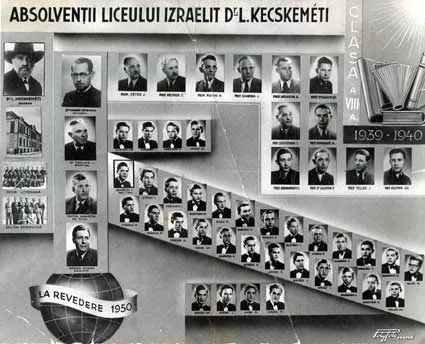Andras Gaspar’s graduation group photo in the Jewish high school
This is the graduation group photo of the Dr. Kecskemeti Jewish high school, in 1940 [straight before the Second Vienna Dictate] There were all boys there, there were no mixed schools then. In the photo, in the left corner there's the school. The group photo of the science and of the humane class. The picture of y husband Andras Gaspar, Andris, is in the lower diagonal row, he's third from left. There is a publication, the Zsidlic, which is published once a year, and it's about students, teachers and memories, who is alive and who died. Everyone got a copy at the class reunion. It is incredible to see how these boys have scattered around the world.
They only organized the first class reunion in Nagyvarad, only once after the war. Just very few of the ones living abroad used to come, because they were afraid of the Romanians and of the Russians. So after that they organized it each year in Israel. I attended the evening classes of the Jewish high-school and graduated there, so I was entitled to the transport costs, but by the time they realized this, my husband was already dead and I didn't want to go alone. They didn't see there was a section for girls, so they only invited the men. They sent the invitation and money to my husband, and the accommodation there was fully covered for him, because we were forbidden to have foreign currency. The Romanian state never made it difficult, because if they sent money and an invitation they were compelled to let them go.
During the Holocaust Andris was a forced laborer in Poland. To be honest, we didn't really talked about this subject. Some time ago I wasn't able to talk about this, I didn't even tell anything to my children. He was a real sportsman, he played tennis and was a swimmer. But when he came back, he was nothing but skin and bones. In the last weeks-months of detention they were all thrown in a relocation camp. He was amongst the first to come home to Nagyvarad. His elder brother has not been deported, because he, for the sake of his wife, converted to Christianism and he wasn't taken away because he wore the white armband. [Editor's note: The white armband was worn by the Christians of Jewish origins, that is the ones who converted, and whom, according to the anti-Jewish laws in force were considered Jews. They have been deported to forced labor units for Christians. Andris was a late-born, his mother was 43 when she gave birth to him. He had an elder sister, who was 16 years older than him, and she didn't come home, neither. And none of his relatives, especially his mother. His father was a lawyer, but he died of heart-attack when Andris was in twelveth grade of high school, and he left them nothing. By then his bother was already working and he had to help out his mother, while Andris had to sustain himself: he gave lessons to the weaker students for money.
When we met he was already working at a mining company, he was the manager at a clay and kaolin mine in Rev [Bihar county]. He was hired as manager although he only had a high school graduation diploma. And from then on he came to Nagyvarad every Saturday-Sunday. Andris was glad too to have someone he could talk about the things [before the war]. We were getting along very well and on Saturday nights we used to go to the Astoria, which was in vogue then. Otherwise the Astoria was owned by my ladyfriend's father. My lady-friend used to come along, she was already married. And he told me joking that, and I'll never forget this: 'We should get married!' I asked her: 'Are you nuts?' I respected Andris very much, but love or something like that it was out of the question... Then he wrote a statement, it got once we moved: 'In full possession of my faculties I sign that I will take Anni as my wife.' The whole thing was a joke.










































